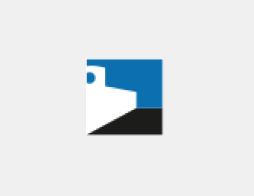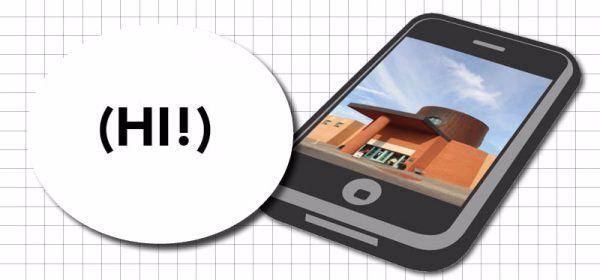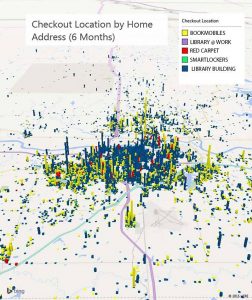What the people want
How your library is doing what all Americans want
This article is cross-posted at the Cengage Learning Blog
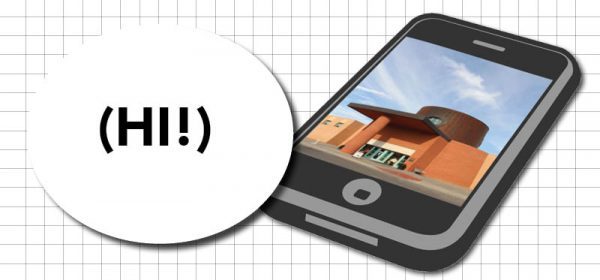
We found out what you want from the library, but we didn't go about it like your typical survey.
Perhaps in the midst of a particularly juicy book, soaking up one-on-one time with my fast-growing 9-year-old or closely watching a new recipe simmer, what would compel me to answer the unfamiliar number, but also to converse with a researcher for an indeterminate spell? Well, for one thing, I’d pretty much drop everything and let dinner burn to gab with any stranger, on the phone or otherwise, when the topic is libraries.
As the library's Communication Editor, I am enamored with the “public” part of the public library. How does the public feel about our services? How will they react to a minor or a major change? How can we engage them, help them feel a part of the community through literacy and learning, and subsequently change their lives for the better?
My library is focused on the public and the public good. It’s asking the right questions, discovering people’s goals and needs and assisting them so they can reach them. Ultimately, it’s about making a difference in the community by working with our fellow citizens to change lives for the better. That’s a good chunk of the reason why we’re the Library Journal / Cengage Learning 2016 Library of the Year. We have our ears to the ground.
When the Pew Research Center report, Libraries at the Crossroads, was released in September 2015, I wondered about the people on the other end of those cell phones and land lines. Those individuals that Pew cites variously as “a share of Americans,” “a majority of Americans,” or “low-income Americans” are real individuals with busy lives, loved ones and their own dinners to prepare. Yet, they all sat a spell to gab about libraries.
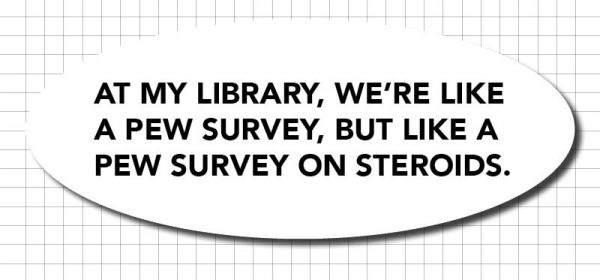
At my library, we conducted a large-pool survey, too. But we also talked to people who live in our midst, our customers, our politicians and leaders. We talked to people who live in Central Topeka – our neighbors, in fact, since we operate out of a single downtown building and from a fleet of bookmobiles. We met in person with people in the rural outskirts of the county and in the community centers and church basements in the heart of the city. At my library, we’re like a Pew survey, but a Pew survey on steroids. We’re interested … no, strike that. We’re obsessed with what our customers think.
“Great libraries align their goals with the dreams and aspirations of their communities,” says our library’s CEO, Gina Millsap.
Like Pew, we also love to ask our community questions, such as, “What are your hopes and dreams for yourself and your family?” “What kind of community do you want?” “How can the library support and make a difference for you and the community?”
We invested in a large survey pulling from a statistically significant pool of the population. We conducted SOAR analyses with our Board of Trustees, our Friends of the Library Board and our Foundation Board. We asked our staff of 225 what they thought. We then held a series of community meetings throughout the city. Our management team and librarians facilitated the meetings, armed with their Effective Facilitator/Masterful Meetings™ facilitation training.
We went beyond the impersonal questionnaire and hiked up our hems to wade into the needs and wants of our community. While our brand of questioning in our home community differed from how Pew conducted their research, what we found mirrors a lot of what the Pew Center reported in their wider study.
Here are 3 ways in which the people of Topeka and Shawnee County and the people of America agree about the role of libraries:
1. Libraries should offer free early literacy programs to help young children prepare for school.
According to the Pew report, 85% of Americans age 16+ believe that libraries should have a role in getting kids ready for school. In our community, early literacy was a top priority for 44% of public respondents, and factored as a high priority in all of our community and internal meetings.
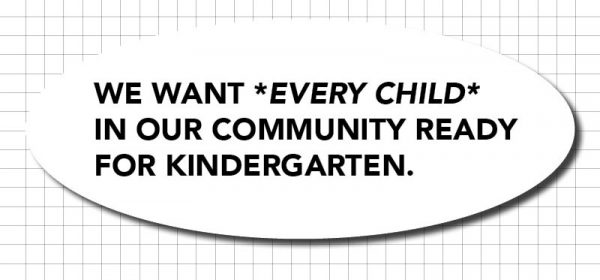
This response helped form the first of our 5 Community Impact Goals: “Every child will be ready for kindergarten.” Fueled by the goal, we’ve initiated programs and services designed to increase access to early learning opportunities, and we continue to fight on many fronts to make that goal a reality. We want every child in our community ready for kindergarten.
2. Libraries should offer programs to teach people, including kids and senior citizens, how to use digital tools such as computers, smartphones and apps.
The Pew report says that 78% of Americans see libraries as access points to education, particularly with regard to teaching tech skills. 27% of our people surveyed felt the same, and all of our community and internal meetings identified goals including “lifelong education” and “digital literacy” as high priorities.
Our two full-time trainers teach 43.5 hours of classes per month to people left behind by the digital age. But teaching inside the building isn’t enough. We’ve embedded librarians at a shared workspace to help entrepreneurs use industrial technology. We’ve supplied community centers in impoverished neighborhoods with computer labs and a part-time library staff technician to service them. We participate in the Community Technology Plan, which seeks to extend high-speed and gigabit speed broadband access to all of Shawnee County. In order to expand digital literacy, you must also close the digital divide.
3. Libraries should create services or programs for local businesses and entrepreneurs.
The Pew report states that 52% of Americans believe libraries “should definitely” focus on business resources. 18% of our respondents were on the same page, and our further face-to-face feedback turned up more of the same sentiment. Nurturing our community’s economic vitality is, according to our community, a big part of our role as a library.
We take that role seriously. We employ a full-time business librarian with an MBA and an MLS. We’re that third place for entrepreneurs who rely on the library for a place to do market research and meet clients, WiFi-supported with a gigabit connection, and where they can order an energy-lifting latte, too. We have a makerspace in the library for people who need access to digital tools like cameras, video equipment, editing software and a 3D printer. But, again, in-house resources aren’t enough.
We’re out in the community armed with our skills as information professionals. Our librarians are putting in hours at a job center and a shared workspace to lend their expertise in writing cover letters, acquiring documents or applying for a small business loan. That’s some of the one-on-one work we’re doing. But we also assist with big picture initiatives that have significant economic impact. For example, we facilitated a discussion about the creation of the Kansas Research Nexus, a project involving our local Chamber of Commerce and chambers in neighboring counties focused on cultivating a regional economic development partnership.
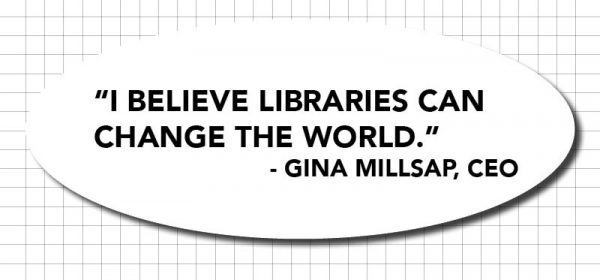
Like the Pew Report shows in facts and figures hard to ignore, libraries truly are “at the crossroads.” Here in Topeka, we’ve managed to get a map before we’ve reached the intersection between tradition and innovation, and so we’re confident we’re headed down the right path as we hone our goals and plans of action to improve the lives of everyone in our community.
“I believe libraries can change the world,” says Gina Millsap. “We’ll do that by helping make our communities be better places to live, work, play and learn.”
The library’s goals for the next decade are intended to facilitate big transformations through literacy and learning:
- Every child will be ready for kindergarten.
- Everyone will discover their passion for learning.
- Everyone will continue learning new ways to live their best life.
- Topeka and Shawnee County will be an engaged community of readers.
- The library will be a learning organization committed to excellence in: Leadership, planning, customer focus, process management and partner focus.
As we accept the laurels of our Library of the Year designation, we keep on believing in the world-changing capacity of libraries, yes. But beyond that optimism, we have concrete evidence of what our community wants. Now is the time for action.









